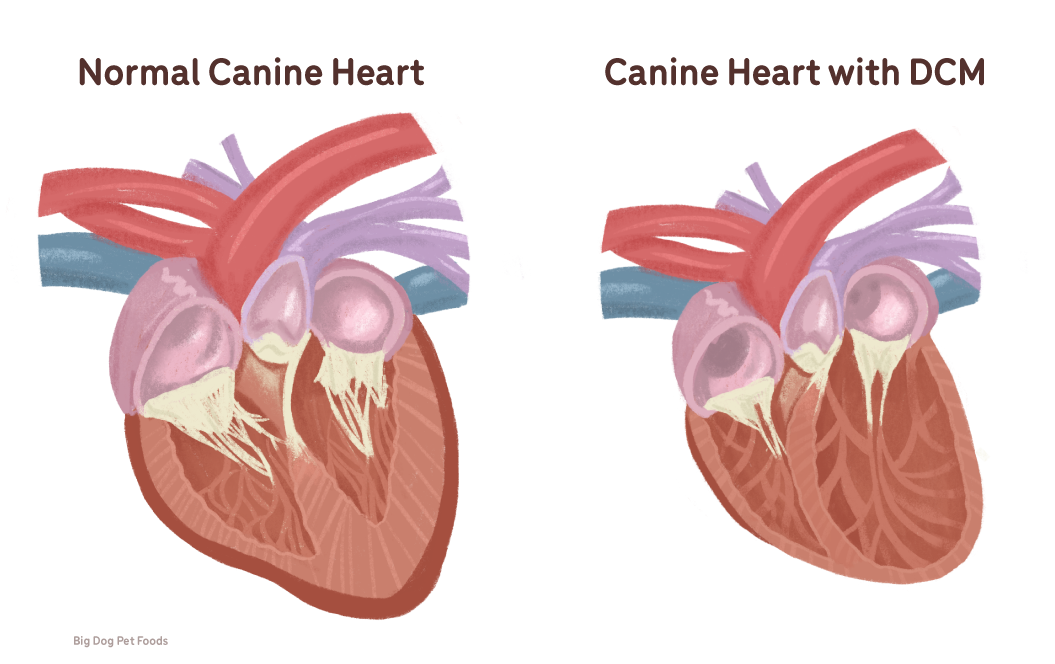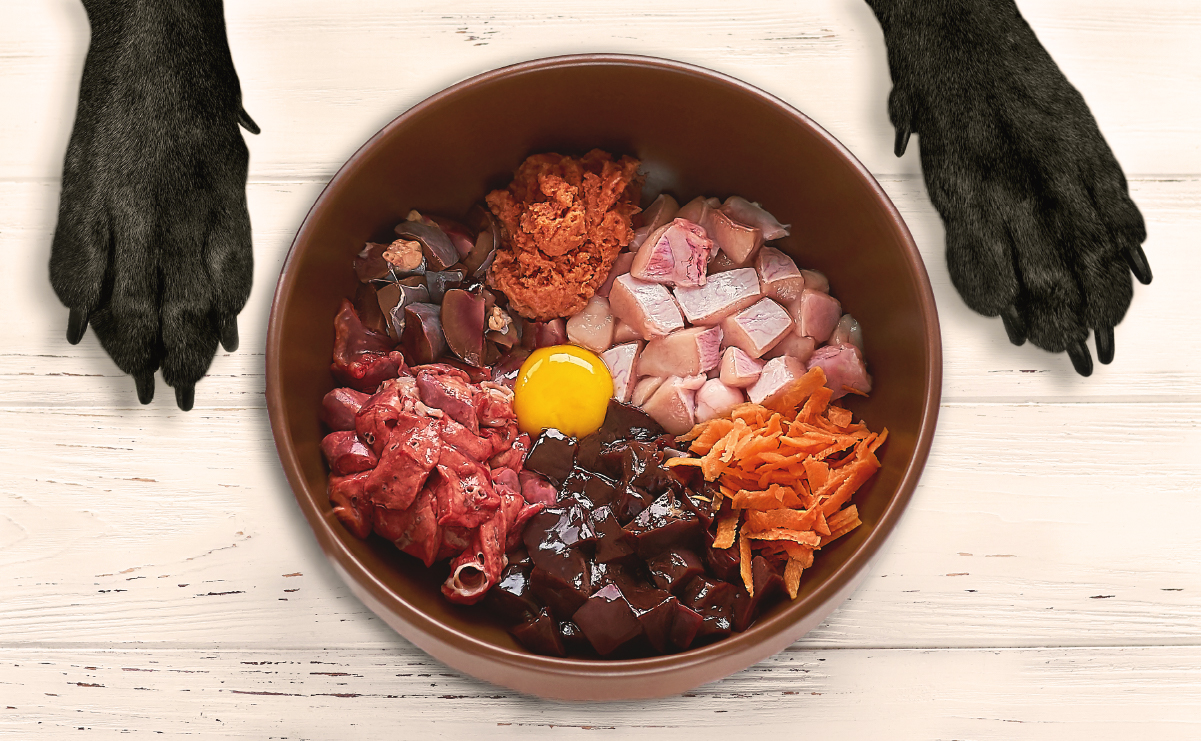DCM and Heart Disease in Dogs and the Role Diet Plays

By Dr Duncan Houston, Veterinarian and Pet Nutritionist
You may have seen online, or have been told recently that dogs need to go back to a diet that contains grains so they don’t develop a specific type of heart disease called Dilated Cardiomyopathy (DCM).
This isn’t exactly quite so cut and dry and the Food and Drug Administration (FDA) in the US has attempted to find a correlation between certain ingredients in pet food and DCM, pointing at grain-free diets as the issue last year, naming 16 specific brands, but have been unable to find a direct link (13,14,15).
There has been a great deal of speculation and assumptions made off the back of this investigation and I’ll attempt to summarise these as clearly and simply as possible.
It appears that a lack of the amino acid taurine may play an important role in the disease process, although it is still uncertain as to whether it is a lack of dietary taurine causing this or not enough of its amino acid building blocks, methionine and cysteine (3).
It is a complex situation though as DCM can be a multifactorial disease process and taurine levels can vary greatly depending on what is included in a diet.
DCM and Grain-Free Diets; What’s the Link?
Dilated Cardiomyopathy is a cardiac condition whereby there is an enlargement of the heart through weakening of its walls. Over time the heart isn’t able to circulate blood throughout the body properly and there becomes an increase in back pressure resulting in fluid leaking into the lungs and abdomen. Unfortunately, these cases worsen over time and are generally irreversible and fatal.

The FDA began looking into the link between diet and development of this condition after receiving 524 reports of DCM between January 1, 2014 and April 30, 2019, with some of these reports involving multiple animals from the one household. While DCM in dogs is generally seen genetically in several larger breeds, for example golden retrievers, and some other breeds possibly due to taurine and/or carnitine (another metabolic compound involved in heart health) deficiencies, the concern grew when reports increased including a variety of different breeds of varying ages and weights developing the disease. It is worth noting though that the majority of cases were likely underreported (13,14).
The FDA did make the point that the reported DCM cases were possibly associated with grain-free diets where most of the non-hereditary DCM cases were eating diets containing non-soy legumes and pulses (eg. peas, lentils, chickpeas etc.) high in their ingredients lists, but there were still reported cases in animals eating a grain-based diet (13,14).
Of the dogs that developed DCM, the FDA found that 91% were eating a grain-free diet and 93% of the grain-free diets contained peas and/or lentils (13,14).
Legumes, pulses and potatoes, including sweet potatoes, have been used in pet foods for many years now without any issues. However, since the grain-free trend in the pet food market increased, legumes have been used in higher amounts as they contain larger percentages of protein when compared to other vegetables. This is a nice thing for pet food companies to place on the front of their packaging, but it means that grain-free pet foods are able to reduce the amount of costly animal proteins and use higher amounts of cheaper plant proteins in their place. Unfortunately, in doing this it results in a lack of other nutrients which will affect dogs over time, such as a potential deficiency in taurine and its building blocks.
Is a lack of Taurine in these diets the Issue?
There is the link between DCM and taurine deficiency, but in this case, there seems to be more to the issue.
Taurine is noted as an essential amino acid in cats but is not for dogs as they are able to manufacture their own taurine from other amino acids. It can’t be left out of a diet completely as it is necessary for the development and function of the heart muscle cells but also plays an important role in eye, brain and immune function. However, so long as the diet contains some taurine and enough of the amino acids that allow dogs to manufacture their own taurine, methionine and cystine, the diet for the best part, will protect the dog from the development of DCM. The issue with the majority of grain-free kibble is that it’s high in legume content and low in animal protein, which is the source for taurine. The reasoning behind a high legume content is to keep the protein level up but this doesn’t restore that lack of taurine, which unfortunately doesn’t have a minimum value with pet food regulations for dog food currently (2,3,8).
Recently, the FDA discovered that some larger breeds, including Great Danes, Retrievers, Doberman Pinschers and Irish Wolfhounds, can’t manufacture enough taurine when fed a diet that’s low in animal protein. These cases developed DCM, which is similar to what was killing cats years ago when the FDA found they had to have taurine in their diets to prevent this. Although DCM can happen in any breed of dog, these particular dogs had their heart disease partially reversed by adding taurine to their diets (1,4,8,9).

There has not been a clear distinction of the reasons for taurine deficiency as it is not well understood. There are several possibilities though including:
- An overall lack of taurine within the diet, as carbohydrates are low in taurine;
- An issue with synthesis of taurine resulting from a deficiency in the building blocks, methionine and cysteine;
- A lower bioavailability of taurine and it’s building blocks;
- A diet too high in fibre resulting in excretion of bile acids and an increased use of circulating taurine;
- Increased loss of taurine through urination;
- A change in metabolism of taurine within the intestines depending on gut microbes and microbial changes;
- Breed-related metabolic differences and genetic variances (3,5,6,7,8,11)
How to Prevent DCM

Aside from genetic predispositions, it pretty much boils down to the quality of protein within the diet. We need to focus on protein quality as legumes lack certain amino acids and the current guidelines for pet foods aren’t setting targets for minimum values.
If you’re looking for a diet that contains high quality protein and is rich in taurine for your dog, here are some guidelines to follow:
Include a high percentage of animal based protein in their food.
- Including offal as it generally contains higher levels of taurine than muscle meat.
- Raw meat is best as taurine can be reduced in a diet that is cooked (10).
Avoid foods low in animal protein.
- Don’t get caught out by the front of the packet stating the amount of protein in a food! As stated before, pet food manufacturers know they can reduce the animal protein by increasing the plant protein content, which for one is an inferior protein source but also results in a lack of other nutrients within the food. Synthetic additions to a diet are generally not as beneficial as natural ones.
Stay away from lentils, peas, chickpeas and potatoes, including sweet potatoes.
- Several of these are high in phytic acid which blocks absorption of specific nutrients.
- Your dog doesn’t necessarily need a lot of, if any, carbohydrate to function at an optimal level.
The issue I see here is that pet food manufacturers and government bodies are still trying to work out how to make a complete and balanced scientifically formulated food, or so be it, kibble.
I understand that the majority of pets may appear to do well on these diets but if there isn’t anything like this for humans then why do we place so much trust in pet food companies to scientifically formulate a diet down to adding specific amounts of vitamins and minerals?
My opinion and what I have observed with my patients is when animals are fed a diet consisting of whole foods made from natural sources, then there is a much lower risk of any issues arising. Many pet parents don’t have the time or confidence to provide this diet themselves and rely on natural food manufacturers to provide a complete diet, minced from whole natural ingredients and combined for convenience. The less synthetic additives, the better.
If you’re reading this article and your dog has been fed a diet rich in the non-animal proteins we have discussed, a vegetarian or a vegan diet for a short or long duration, there’s no harm in adjusting the diet to a high animal based protein raw diet. If you do this it will help prevent this disease process from happening or even possibly help reverse changes that may have occurred to the heart.
If you have any concerns, you can have your dog’s blood tested for levels of taurine to assess if your current diet is adequate. Measuring taurine levels isn’t too hard, you just need to see your regular vet and have both plasma and whole blood samples taken. I would recommend those who have been feeding a vegetarian, vegan or home prepared diet to have this checked as it’s not hard to supplement taurine if it’s needed. There isn’t an optimal taurine dosage for dogs with a deficiency as it isn’t fully understood but the recommendation of oral supplementation is: for dogs less than 25kg: 500-100mg every 8-12 hours; and for dogs larger than 25kg: 1-2g every 8-12 hours.
Additional tests include ECG (echocardiogram) and Ultrasound assessment performed by a specialist ultrasonographer or Cardiologist to evaluate heart function if warranted or concerned.
If you’re worried your pet may have DCM due to the diet they’ve been on, here are some signs of DCM:
- Coughing
- Panting
- Weakness/Fainting
- Easily tired / Not wanting to exercise
- Stumbling
- Abdominal Distension
All dogs diagnosed with DCM should be supplemented with taurine however, my philosophy is that prevention is always better than cure and there is no harm to trial your dog on an animal based raw diet for future prosperity.

About the Author:
Duncan is a Veterinarian and pet nutrition expert based in Sydney who works mainly as a mobile vet, but also in emergency and general practice. He has a passion for aquatics and nutrition, working with several natural pet food companies for over half a decade.
Triathlon and cycling were integral parts of Duncan’s life where he competed in several different countries taking home numerous achievements. He has always been active and maintains a healthy and exercise induced lifestyle, which he projects onto the animals he treats.
Duncan hopes he can provide you with up to date research and make it relevant to your pets at home. Better to be healthy now and get things right, such as nutrition early, as prevention is always better than cure.
References:
1. Bélanger MC, Ouellet M, Queney G, et al. Taurine-deficient dilated cardiomyopathy in a family of Golden Retrievers. J Am Anim Hosp Assoc 2005;41:284–291. Available at: https://meridian.allenpress.com/jaaha/article-abstract/41/5/284/103577
2. Bragg RR, Freeman LM, Fascetti AJ, et al. Composition, disintegrative properties, and labeling compliance of commercially available taurine and carnitine dietary products. J Am Vet Med Assoc 2009;234:209–213. Available at: https://avmajournals.avma.org/doi/abs/10.2460/javma.234.2.209
3. Delaney SJ, Kass PH, Rogers QR, et al. Plasma and whole blood taurine in normal dogs of varying size fed commercially prepared food. J Anim Physiol Anim Nutr (Berl) 2003;87:236–244. Available at: https://onlinelibrary.wiley.com/doi/abs/10.1046/j.1439-0396.2003.00433.x
4. Fascetti AJ, Reed JR, Rogers QR, et al. Taurine deficiency in dogs with dilated cardiomyopathy: 12 cases (1997–2001). J Am Vet Med Assoc 2003;223:1137–1141. Available at: https://avmajournals.avma.org/doi/abs/10.2460/javma.2003.223.1137
5. Freeman LM, Rush JE, Brown DJ, et al. Relationship between circulating and dietary taurine concentrations in dogs with dilated cardiomyopathy. Vet Ther 2001;2:370–378. Available at: https://pubmed.ncbi.nlm.nih.gov/19746660/
6. Freeman, L., Stern, J., Fries, R., Adin, D. and Rush, J., 2018. Diet-associated dilated cardiomyopathy in dogs: what do we know?. Journal of the American Veterinary Medical Association, [online] 253(11), pp.1390-1394. Available at: https://avmajournals.avma.org/doi/10.2460/javma.253.11.1390
7. Ko KS, Fascetti AJ. Dietary beet pulp decreases taurine status in dogs fed low protein diet. J Anim Sci Technol 2016;58:29. Available at: https://link.springer.com/article/10.1186/s40781-016-0112-6
8. Kramer GA, Kittleson MD, Fox PR, et al. Plasma taurine concentrations in normal dogs and in dogs with heart disease. J Vet Intern Med 1995;9:253–258. Available at: https://onlinelibrary.wiley.com/doi/abs/10.1111/j.1939-1676.1995.tb01076.x
9. Pion PD, Kittleson MD, Rogers QR, et al. Myocardial failure in cats associated with low plasma taurine: a reversible cardiomyopathy. Science 1987;237:764–768. Available at: https://science.sciencemag.org/content/237/4816/764.abstract
10. Spitze AR, Wong DL, Rogers QR, et al. Taurine concentrations in animal feed ingredients; cooking influences taurine content. J Anim Physiol Anim Nutr (Berl) 2003;87:251–262. Available at: https://onlinelibrary.wiley.com/doi/abs/10.1046/j.1439-0396.2003.00434.x
11. Tang WHW, Hazen SL. The gut microbiome and its role in cardiovascular diseases. Circulation 2017;135:1008–1010. Available at: https://www.ahajournals.org/doi/full/10.1161/CIRCULATIONAHA.116.024251
12. Tôrres CL, Backus RC, Fascetti AJ, et al. Taurine status in normal dogs fed a commercial diet associated with taurine deficiency and dilated cardiomyopathy. J Anim Physiol Anim Nutr (Berl) 2003;87:359–372. Available at: https://onlinelibrary.wiley.com/doi/abs/10.1046/j.1439-0396.2003.00446.x
13. U.S. Food and Drug Administration. 2018. FDA investigating potential connections between diet and cases of canine heart disease. [online] Available at: www.fda.gov/AnimalVeterinary/NewsEvents/CVMUpdates/ucm613305.htm
14. U.S. Food and Drug Administration. 2019. FDA Investigates Potential Link Between Diet & Heart Disease In Dogs. [online] Available at: https://www.fda.gov/animal-veterinary/outbreaks-and-advisories/fda-investigation-potential-link-between-certain-diets-and-canine-dilated-cardiomyopathy#:~:text=In%20July%202018%2C%20the%20FDA,flour%2C%20protein%2C%20etc.)
15. U.S. Food and Drug Administration. 2020. Scientific Cooperation Will Lead To Understanding Of Nonhereditary DCM. [online] Available at: https://www.fda.gov/animal-veterinary/cvm-updates/interdisciplinary-scientific-cooperation-will-lead-way-understanding-non-hereditary-dcm
Additional Information and Articles:
- https://www.fda.gov/animal-veterinary/science-research/vet-lirn-update-investigation-dilated-cardiomyopathy
- https://www.fda.gov/animal-veterinary/animal-health-literacy/questions-answers-fdas-work-potential-causes-non-hereditary-dcm-dogs
- https://www.petfoodindustry.com/blogs/7-adventures-in-pet-food/post/8861-fdas-latest-dcm-update-no-news-is-status-quo
- https://news.vin.com/default.aspx?pid=210&Id=9933507
- https://www.petfoodprocessing.net/articles/14240-fda-walks-back-from-update-correlating-dcm-and-certain-pet-diets
- https://www.petcurean.com/blog/diet-and-dilated-cardiomyopathy-dcm-in-dogs/
- https://www.fda.gov/animal-veterinary/cvm-updates/fda-provides-third-status-report-investigation-potential-connection-between-certain-diets-and-cases
- https://www.fda.gov/animal-veterinary/cvm-updates/fda-provides-update-investigation-potential-connection-between-certain-diets-and-cases-canine-heart
- https://www.fda.gov/animal-veterinary/cvm-updates/fda-investigating-potential-connection-between-diet-and-cases-canine-heart-disease
- https://avmajournals.avma.org/doi/full/10.2460/javma.253.11.1390
- https://www.fda.gov/animal-veterinary/news-events/fda-investigation-potential-link-between-certain-diets-and-canine-dilated-cardiomyopathy-february
- https://www.ksvdl.org/resources/dilated-cardiomyopathy-dogs-forum.html
- https://www.ksvdl.org/resources/documents/dcm-forum/DCM-Forum-SolomonOpening-Remarks.pdf
- https://www.ksvdl.org/resources/documents/dcm-forum/FDA_KSU-Science-Forum-slides_09-29-2020.pdf
- https://news.vin.com/default.aspx?pid=210&Id=9164603
- https://www.petcurean.com/blog/taurine-for-cats-and-dogs/
- https://www.petcurean.com/blog/taurine/
- https://www.petcurean.com/blog/how-much-protein-should-pet-food-contain/
- https://www.dogsnaturallymagazine.com/taurine-diet-and-heart-disease-in-dogs/
- https://www.dogsnaturallymagazine.com/3-bullhit-moves-revealed-pet-foods-hide-crappy-proteins/
- https://www.dogsnaturallymagazine.com/news-fda-reports-some-dog-foods-may-cause-heart-disease/
- https://www.dogsnaturallymagazine.com/dysbiosis-in-dogs-causes/
- https://avmajournals.avma.org/doi/10.2460/javma.253.11.1390
